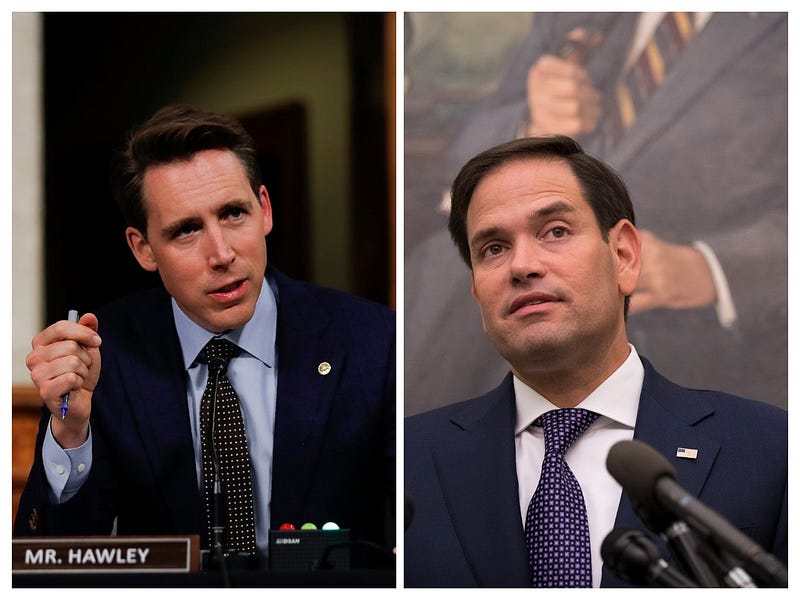Future historians of the American right are going to have a devil of a time figuring out what the hell happened as the second decade of the 21st century came to a close. But every day I become more convinced about at least one of their conclusions: The nationalists blew it.
Now, for those who don’t enjoy the nuances of conservative taxonomy, I should explain that I am using “nationalist” broadly, to include various camps on the right that think the U.S. has been too globalist and too reverential of the free market at the expense of social cohesion and a patriotic sense of national unity.
Nationalists are a diverse group, containing serious scholars like Notre Dame’s Patrick Deneen and Harvard Law School’s Adrian Vermeule. This group also includes sharp, ambitious politicians like Sens. Josh Hawley and Marco Rubio, insightful writers like New York Post op-ed editor Sohrab Ahmari, and the familiar retinue of MAGAnauts, America Firsters, rabble-rousers, Trump boosters and populist opportunists.
They don’t all agree with one another, and they don’t all go by the “nationalist” moniker. But as a general proposition, I think most start from faulty premises about the nature of nationalism or the benefits of President Trump’s embrace of it. I am proudly a pre-Trump conservative who thinks both Trump and the nationalist cause are not what conservatism needed.
Regardless, what unites them all is the notion that the Trump presidency and its emphasis on “America First” brought a long overdue correction to our politics. Nationalism, they argue, is an essential part of a healthy society, because it offers a unifying ethos—a sense of collective identity and social solidarity.
They often go in different directions from that starting point. Some favor building walls, both literal and figurative, around America so we can keep away both foreign wares and foreign workers. Others are eager to find a rationale for a hawkish anti-China agenda. Some simply spout a lot of slogans to provide a semblance of an ideologically coherent argument behind Trump’s erratic and glandular governing style.
The coronavirus was a gift delivered to all of them, but they refused to sign for it. And while the China hawks have certainly (and to some extent, rightly) benefited, the larger movement missed its shot.
World War II—a touchstone for all notions of American greatness—was the last time the whole country mobilized for a common cause. Since then, wars have been fought, and felt, by an ever-shrinking fraction of the country. All the other unifying moments—the Cuban missile crisis, the moon landing, etc.—have been experienced by most Americans at a distance, usually on a TV screen.
Whether or not it would have been the right policy, the pandemic could have been the perfect crisis mechanism for implementing a WWII-style, top-down nationalist agenda for the common good. But Trump, who claims “total authority” to do whatever he thinks is necessary to fight the pandemic, opted to embrace federalism and the free market rather than asking us to pull together as a country united in a cause.
A virus that threatens every American, but the old and vulnerable especially, should have been a boon to pro-life Catholic nationalists who champion the seamless garment of life, extol the virtues of respecting our elders and yearn for a right-wing New Deal. Mobilizing to their defense, even at a deep cost to the free market they deride, should have been an easy call. Instead, they’ve opted to take their lead from Trump and turn face masks into a culture war symbol, denouncing mask-wearing as “cowardly” obeisance to tyranny.
During both world wars, every American institution and citizen was politically and, to a great extent, legally dragooned into the war effort. These “we’re all in it together” mobilizations permanently expanded the federal government and the nationalization of our politics. Since then, nationalist appeals to the whole country have been subordinated to partisan politics and the culture war. Calls for national unity from one party are seen as an attempted power grab by the other, and often for good reason.
But pandemics, like wars, offer an opportunity for such calls to work, precisely because they are perceived as necessary. If Trump were the nationalist many of his supporters think he is—or, frankly, the dictator his foes take him for—this would have been the nationalists’ moment. Trump refused to seize it because he needs domestic enemies to galvanize his base and rationalize his re-election. And for many of the nationalists, it seems his needs are more important than the country’s.
Photographs of Josh Hawley and Marco Rubio from Getty Images.







Please note that we at The Dispatch hold ourselves, our work, and our commenters to a higher standard than other places on the internet. We welcome comments that foster genuine debate or discussion—including comments critical of us or our work—but responses that include ad hominem attacks on fellow Dispatch members or are intended to stoke fear and anger may be moderated.
With your membership, you only have the ability to comment on The Morning Dispatch articles. Consider upgrading to join the conversation everywhere.